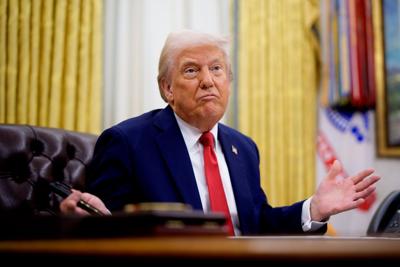Do you worry that the United States will take over Canada?
Many Canadians do, though avian flu and the measles outbreak are more realistic threats than a U.S. annexation of Canada.
Paul Arcand, a veteran political observer at Montrealās La Presse, writes that āI get asked this question every dayāĀ ā will America use military force to take over Canada?
U.S. economic growth has slowed, job growth is slumping, and delinquencies in auto payments and
Itās not conspiracy theorists asking this question, says Arcand in a March 29 column.
āNo. Iām talking about concerned citizens who wonāt rule out any scenario, the Monarch (U.S. President Donald Trump) is so impulsive and unpredictable. Thereās no logic. Rants, intimidation, changes of direction. Anything seems possible.ā
And Star columnist Andrew Phillips notes the recent āslew of commentaries contemplating the possibility of American military force being used against Canada.ā
Upfront pain for promised long-term gain is the current mantra of the Trump White House. For
āA common threadā of those commentaries, Phillips reports, āis the comparison between (Russian President Vladimir) Putinās treatment of Ukraine and Trumpās view of Canada.
āBoth see the adjoining territory as not quite legitimate, as part of their natural sphere of influence, as theirs for the taking.ā
In calling a federal election for April 28, Prime Minister Mark Carney said that Trump āwants to break us, so America can own us.ā
Trump himself said in early February that āIād like to see Canada become our 51st ²õ³Ł²¹³Ł±š.ā
And who wouldnāt covet Canada?Ā
Canada is the worldās second-largest land mass, and 10th largest economy with more than $3 trillion in GDP last year.
Canada is a major breadbasket and resource producer that helps maintain Americaās food and energy security.
A new survey found that nearly half of Canadian businesses are planning to shift investments or
Nothing would embellish Trumpās legacy more than annexing Canada, a triumph that would eclipse Thomas Jeffersonās Louisiana Purchase.
And among the many experts canvassed by Arcand and Phillips, there was, of course, talk of Canadaās modest military resources.
āCanada is an indefensible territory,ā Jocelyn Coulon, editor-in-chief of the Montreal Council on Foreign Relations blog, told Arcand.
āIn the event of a confrontation, (the Americans) will send us a text saying āsurrenderā and we will have no choice!ā
The comparison with Ukraine is indeed eerie.
Putin doesnāt mean to permanently occupy Ukraine, a costly endeavour that Russia canāt afford. He means instead to āwreckā it so that Ukraine is of no use to a NATO it sought to join, and whose leaders he would replace with Kremlin stooges.
Trump seeks a bloodless Canadian takeover. He has said he might use military force to gain control of Panama and Greenland but has ruled that out in Canada.
āN“Ē, economic force,ā he said when asked about a U.S. military invasion of Canada in a Jan. 7 press conference.
To be sure, most U.S. presidents have their wars. Yet Trump has not been a war president.
Quite the opposite. Trump helped negotiate a historic peace agreement between Israel and the United Arab Emirates in his first term.
And Trump used diplomacy rather than a U.S. naval blockade or cruise missile attacks in trying, without success, to encourage North Korea to curb its nuclear weapons ambitions.
In his second term, Trump has upset the world order by revoking Americaās long-standing commitment to militarily protect Europe.
Trump has scaled back U.S. military aid to Ukraine and has shied away from protecting Taiwan from Chinaās predations.
Trump came of age during the debacle of the U.S. war in Vietnam, whose unpopularity at home cost Lyndon Johnson the presidency.
Trump later watched George Bush struggle with an Iraqi quagmire of his own making, and the U.S. failure to destroy the Taliban in Afghanistan after a 20-year effort.
Record debt and deficits and a budget on an ‘unsustainable path.’ The U.S., writes David Olive,
The U.S. has a poorĀ track record in wars where the American homeland is not at stake.
And Trump would utterly lack domestic support for a Canadian invasion.
An Angus Reid poll of Americans in March found that just two per cent of respondents favoured a U.S. military takeover of Canada.
And beating Canada into submission by making our exports unaffordable in the U.S. wonāt happen.
Key Canadian exports including oil and gas, aluminum, potash and uranium will continue to sell in the U.S. market. Procurement habits are hard to break. And for many essential Canadian imports, there are no attractive alternatives.
To be sure, we should brace for significant job losses in manufactured exports, notably in the auto sector. Governments are preparing income protections for workers harmed by Trumpās tariffs.
But Canada is less reliant on exports than is commonly supposed.
Exports peaked at about 45 per cent of GDP in 2000.
And the value of our exports has steadily grown since.
Yet today almost 80 per cent of Canadian economic activity consists of internal production and consumption of goods and services.
They include major employers like hospitals, power utilities, telcos and supermarketsĀ ā āindustries that Donald Trump canāt reach,ā said Canadian economist Jim Stanford in a recent Star essay.
And thanks to the Buy Canadian movement, that internal economy is growing stronger by the day.




































To join the conversation set a first and last name in your user profile.
Sign in or register for free to join the Conversation